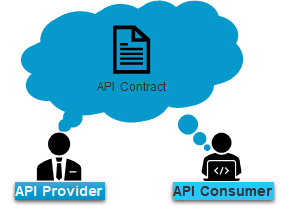API First Implementation
APIs form the nerve center of software applications. So, it is very important for the providers to be clear about what they would provide and consumers to be clear about what they want to consume. Better understanding of APIs guarantee an excellent output. API First is all about the establishment of a common agreement between the providers and consumers. Thus, this design helps both the parties to be on the same page.
When adapting API First approach, API developers start the API development with the API contract and work on the implementation part at a later stage. This approach of prioritizing the API design over its implementation is beneficial to both, providers and consumers.
In conventional scenarios, providers expose APIs to their consumers only after the API is implemented. Consumers test the API and let the providers know their feedback about the API. Providers must then revisit the API to incorporate the feedback received from their consumers. You can optimize this process by adapting API First design.
When following API First approach, consumer does not have to wait for the provider to implement the API, they can proceed with their application development using the exposed API. The implementation status of API does not have an impact on consumers as they receive the designated responses for their requests through the mocked API. So, the API development and the application development can take place at the same time.
Once the provider implements the API, the end-point is updated to divert the invocations to the actual implementation instead of mocked response. The provider can then disable mocking.
The following diagram explains the flow of API development as per the API First design:
As per the API First design, providers expose their API to consumers when the development is underway.
API First Design using API Gateway
Starting API Gateway 10.5, the application provides seamless support for API First approach for your APIs.
Using API Gateway, you can define API contract for the APIs and download provider specification for the APIs that you create. As a provider, you would not want to expose all resources and methods of an API to consumers. The API Contract given to the consumer has only the part of API exposed to the consumer whereas the provider specification comprises of the complete specification. This is useful for providers to implement the API.
You can enable mocking and activate the API for consumption. The mocked version of API returns respective responses for the consumer requests. This ensures the required end-user experience to the consumers.
When the API is ready to be implemented, you can implement your APIs in Integration Server or any other implementation server. If you are using Integration Server, you can add the required Integration Server instance in API Gateway. You can add multiple Integration Server instances and publish your API to the required instance. If you are using Integration Server, you can send the API contract from API Gateway. Else, the API contract has to be retrieved from API Gateway.
After implementation, you can update the actual implementation end-point to API Gateway. This step is mandatory to disable API mocking and divert the invocations to the actual end-point.
The following workflow shows the high-level workflow of API First implementation approach using API Gateway:



